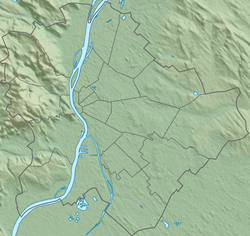The Rumbach Street Synagogue (Hungarian: Rumbach utcai zsinagóga), also called the Status Quo Ante Synagogue, is a Neológ congregation and synagogue, located in Belváros, the inner city of the historical old town of Pest, in the eastern section of Budapest, Hungary. Since 2021, the building has also been used as a concert hall and Jewish museum.
| Rumbach Street Synagogue | |
|---|---|
Hungarian: Rumbach utcai Zsinagóga | |
 Towers of the synagogue in 2007 | |
| Religion | |
| Affiliation | Neolog Judaism |
| Rite | |
| Ecclesiastical or organisational status |
|
| Status | Active |
| Location | |
| Location | Rumbach Sebestyén St. 11-13, Belváros, Budapest |
| Country | Hungary |
Location of the synagogue in Budapest | |
| Geographic coordinates | 47°29′52.1″N 19°3′31.8″E / 47.497806°N 19.058833°E |
| Architecture | |
| Architect(s) | Otto Wagner |
| Type | Synagogue architecture |
| Style | Moorish Revival |
| Groundbreaking | 1869 |
| Completed | 1872 |
| Specifications | |
| Direction of façade | Southwest |
| Length | 50 meters (160 ft) |
| Width | 35 meters (115 ft) |
| Height (max) | 28 meters (92 ft) |
| Dome(s) | Two (maybe more) |
| Materials | Brick |
| [1] | |
History
editThe synagogue was built in 1872 for the The Status Quo congregation to the design of Otto Wagner, a Viennese architect.[2] Intentionally meant to serve the members of the Neológ community of Pest, its construction coincided with the Schism in Hungarian Jewry of 1869, and it became the home of the more conservative fraction.
Completed in the Moorish Revival style, the synagogue has eight sides and was restored during 2021 with a grant from the Budapest Government. The octagonal, balconied, domed synagogue intricately patterned and painted in Islamic style is exquisitely beautiful. It was built not as an exact replica of, but as an homage to the style of the octagonal, domed Dome of the Rock shrine in Jerusalem.
Historically, but especially since the completion of its renovation in the summer of 2021, the synagogue regularly hosts plays, concerts, photo exhibits and other cultural events.[3]
A modern, revamped and restored building was inaugurated in June 2021. The restoration costs included a US$11.2m grant from the Hungarian state.[4][5]
Gallery
edit-
Interior
-
Façade
-
Project by Otto Wagner
See also
editReferences
edit- ^ "Status Quo (Rumbach St.) Synagogue in Budapest". Historic synagogues of Europe. Foundation for Jewish Heritage and the Center for Jewish Art at the Hebrew University of Jerusalem. n.d. Retrieved July 18, 2024.
- ^ Krinsky, Carol (1996). Synagogues of Europe. New York: Dover Publications. p. 108. ISBN 0-486-29078-6 – via Google Books.
- ^ "Beautifully restored Rumbach Synagogue now home to religion and culture". We Love Budapest. June 25, 2021.
- ^ "Revamped Rumbach Synagogue Inaugurated – Photos!". Hungary Today. June 10, 2021. Retrieved February 21, 2022.
- ^ "After 60 years of decay Budapest's grand Rumbach synagogue has new lease on life". The Times of Israel. 2021.
Bibliography
edit- Kalmar, Ivan Davidson (2001). "Moorish Style: Orientalism, the Jews, and Synagogue Architecture" (PDF). Jewish Social Studies. 7 (3): 68–100. doi:10.2979/JSS.2001.7.3.68. hdl:1807/35319. S2CID 162229425. Retrieved March 19, 2008.
- Kaufman, Rachelle (2015). An American Jew in Budapest.
- Muller, Ines (1992). Die Otto Wagner-Synagoge in Budapest (in German). Wien: Löcker. ISBN 978-3-85409-200-1.
- Szegő, György (2004). "The Gozsdu Court in the Jewish Triangle". The Hungarian Quarterly. XLV (76). Archived from the original on May 29, 2006. Retrieved March 19, 2008.
- This article incorporates text from a publication now in the public domain: Deutsch, Gotthard; Büchler, Alexander (1901–1906). "Budapest". In Singer, Isidore; et al. (eds.). The Jewish Encyclopedia. New York: Funk & Wagnalls.
- "The Synagogue Triangle". Jewish.hu. Archived from the original on May 22, 2013.
External links
editMedia related to Rumbach Street Synagogue at Wikimedia Commons
